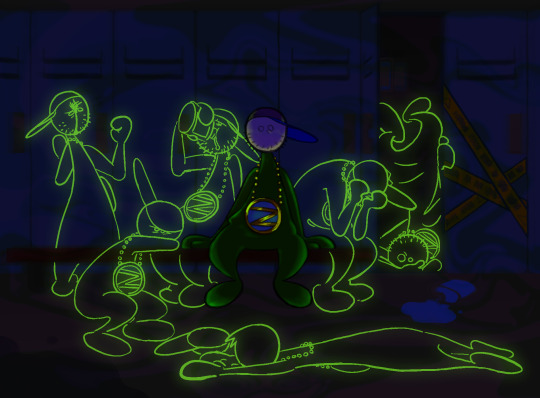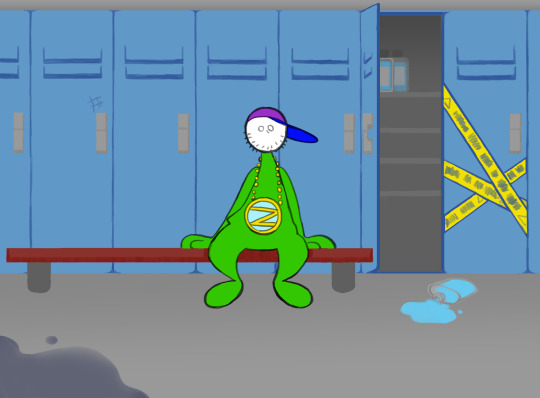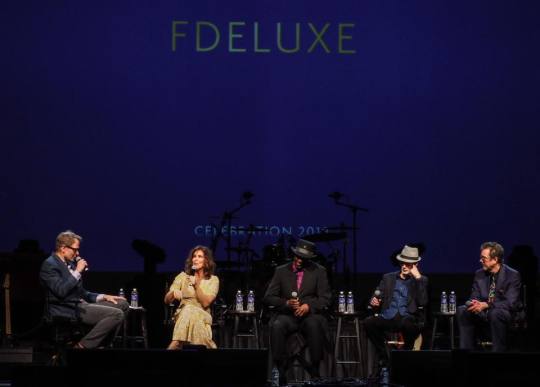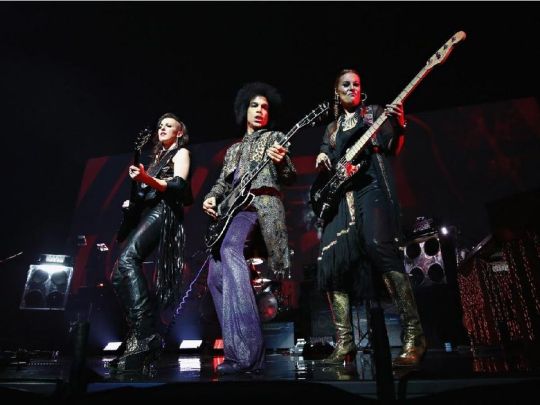#this was inspired by a really old coach z edit shout out to that one
Explore tagged Tumblr posts
Text

ive got problems, not just the ones that are little big ol people problems theres somethin to consider! when you come for dinner at my place!
(variations below!!!!)


#homestar runner#h*r#coach z#i dont know if this counts as#eyestrain#but ya#this was inspired by a really old coach z edit shout out to that one#minor blood#sorry i injected a lot of angst into this one#like. A lot#let me have thisa little bit
95 notes
·
View notes
Text
Celebration Day 4 : VIP Edition
Part 3 here!
FDeluxe Panel

St Paul Peterson Eric Leeds Susannah Melvoin Jellybean Johnson
This was an interesting panel. The vibe was kind of interesting? I know people are adults, lol, but kind of a good bit of cursing here...and it kind of...went to a place toward the end? But we’ll get to it :
Paul Peterson Origin Story
18 years old. Gets phone call from Bobby Z. (They’re related but not by blood through marriage)
Walked in and played once in audition. Jellybean took him under his wing
Called back the next day and Prince was there.
The Wrecka Stow joke was done on him as part of his initiation before it was in Under the Cherry Moon
Susannah Melvoin
Had known P for a while
Lived in West Hollywood with Wendy and Lisa. The doors of the house were saloon doors so nobody had any privacy.
Prince would come over and spend the night on the couch sometimes
Susannah had first singing gig with Quincy Jones. Sang with Siedah Garrett, Kevin Dorsey, and others. Her audition with Q was singing “Until You Come Back to Me” (Aretha Franklin)
Played demo for Prince. P says “Awww that was adorable”.
Asked to join The Family
She was 18 he was 25.
She says it took 2 weeks to track The Family album
Eric Leeds
P called him for a name for a song he was writing “Purple Pain? Purple Plane?” Eric, “Maybe Purple Rain?”
Brother of Alan Leeds P’s tour manager
Atlanta Bliss and Eric are from Pittsburgh. They moved to Atlanta and shared a house
Eric was considering a career change at the time after touring with high profile acts, got a call from Alan saying P needed a sax player
Eric had no interest and wasn’t into P, but needed a gig.
Had no illusions or exceptions about the experience or Prince. Got along because he came to work.
On the Making of the Family album
The Family album was made when Purple Rain was coming out
They generally worked on their parts separately. Eric didn’t even meet the rest of the band for several months after he added his parts
Peterson had to really study P’s demos. He thought it would be easy. David Z and Jellybean had to coach him a lot to get the inflections right going line by line
They had rehearsals for a year and exactly one gig.
St Paul dipped after getting a deal with A&M records...left the camp “hence P’s ‘PAUL PUNK OF THE MONTH” chants during Parade tour
Last time he saw P was during a party for LP Music in the NPG music room (LP Music is an Eric Leeds band). P gave him a big hug.
On what happened to The Family
The Family was never signed to a label. Their deal wasn’t with WB it was a production deal with Prince.
Prince was in France and wasn’t around to manage so things fell through the cracks
Not having a contract made their relationship “adversarial with P” “Prince wanted to pay as little as possible and they want as much as possible as artists”
WB didn’t know how to handle them because they were not WB artists.
Resided in no man’s land and Prince got the proceeds.
On Fdeluxe
Sheila E called to do an alumni concert at the forum it went well. After, they were invited to play a Questlove Grammy party.
Taped a Fdeluxe album in Susannah’s garage.
Annnd the panel got weird around this time...
Susannah and Eric began riffing on each other. There was cursing? Susannah said the riffing was okay because she used to date Eric? Eric made some suggestive jokes for a while? I honestly wasn’t writing any of this down because I was like...

When they came around again, Susannah mentioned she was the one who connected Clare Fischer to P as he was cool with her father.
MPLS Early Years
Gayle Chapman Dez Dickerson Dr Fink Bobby Z
Gayle Origin Story
Her friends played her P’s album thinking she’d like it
She was listening to “For You” on her own one day and she heard a voice that said “In order for Prince to tour, he’s going to need a band” it scared her as she was alone in her apartment
She called Chazz and asked if he knew Prince. He said he was his cousin and was looking for band members. Set her up with an audition.
Went to house on France ave and jammed with them
Got the call 3 months later to join
Dez Dickerson Origin Story
His little sister had For You. Was “young and arrogant” and thought he could do better.
Answered call in local paper and auditioned at Del’s Tire mart
Jammed for 15 minutes, didn’t take a solo until asked and didn’t show off, falling back into the groove. P walked him out and asked him what he noted as mature questions. (He didn’t embellish more than this, but he does have a book that details this out well if you want to check it out).
Matt Fink Origin Story
His and Bobby Z’s mom did fundraisers for Mt Sinai when they were kids
Bobby played a demo for Fink one day. Fink “who’s the band?” Bobby “it’s one guy he plays all the instruments” Fink *scooby doo sound*
He bugged Bobby for an audition and got one
On their early look
A lot of jokes, lol
“We were soul searching”
“Looked like an explosion in a soup kitchen”
“A lot of spandex and gold”
“Looked like 6 people who had never met each other”
Other stories
Gayle was taken for a ride by a label person. They told her she should go on a diet and work on her finger nails. She noted that it would be a wasted because her fingers would bleed from playing and polish wouldn’t last long.
Dez retells story of the label telling Prince he should wear underwear under his pants...so he just wore the underwear and no pants
Gayle notes that he sometimes wore underwear that laced up in the front.....

On the Capri Show
Bobby Z drove P there because his Datsun got wrecked with an unfortunate encounter with a snow plow. They left the car they rode over in on for 6 hours because it was 20 under.
It was an “us vs them band against the world’ vibe
Music store loaned the band gear, wireless guitar transmitters
Dez said he ran everywhere in the venue, up and down the aisles...which was nice to do...but they also got trucker interference out of their speakers “a lot of 10-4 good buddies”
They noted that they hadn’t rehearsed much for this show
WB thought they’d signed a Smokey/Steve artist...found P was not that.
Other stories
The Rebels was the first side project by P. If I Love You Tonight was originally recorded by Gayle. P told her to cry to get the emotion out of her while singing. The other guys also mooned her because pranksters.
Gayle got her hair “braided and beaded” before coming out to film shows in LA to promote the Prince album. The label immediately took her to get her hair done after. She got no sleep as they finished with her at 5am and she was due to the venue at 10am. “I looked like a white Donna Summer”
During the Midnight Special taping, the staff was “smashed”
For the Dick Clark show, Prince was on antihistamines and had a hard time talking after dancing and such
Told the story about Prince and Dez having an interview with Jon Bream and Bobby losing it over the lack of condiments “There’s no mayonnaise...” and it escalated including a flipped table and an almost flipped couch with Jon Bream sitting on it. P and Dez calmly continued the interview talking about serious topics with straight faces.
First time at First Avenue was to promote Dirty Mind. It was still Sams at the time. They finally connected to a local white audience with that show.
P drove a Jeep at one point
P had jokes on his answering machine that he would rotate. An example “Get off the phone you punk mother [machine beep]
Recounts wheelchair story of P being wheeled to the middle of busy foot traffic, sitting quietly, then slowly falling out of the chair. Sometimes people would help him back in the chair...he’d never say anything and play it straight.
Note : This panel was probably my favorite one. I’d heard most of the stories before, but so glad they spent time on the pre-revolution band. Just missed Andre being there...
Concert Screening Montreal 2015

Rooocked it!!!!
Setlist for the curious
F Deluxe Concert
This was very funky...but this was an odd choice to close out Celebration. Most of the crowd sat during most of this show...appreciate Susannah’s body rolls though! They were inspiring!
Set list
High Fashion Gaslight Sanctified Screams of Passion Nothing Compares 2 U “Come Go with me” lyric River Run Dry Desire Lover Drummers and Healers "Songs going down around the world” lyric Mutiny
And that was it! There was a thanks from Wally and he shouted out Purple Underground, Rodney Fitzgerald, and Michael Dean (Yay Prince Podcast) in a kind of awkward way that thanked them for the opportunity and we were on our way. (I imagine that what was kind of confusing to people who didn’t know who those people were but...)
And so concluded Celebration 2018!
94 notes
·
View notes
Text
The Empty Blockbuster Music of DJ Khaled
His latest album, “Khaled Khaled,” seems to exist solely for the pursuit of clout.
— By Sheldon Pearce | The New Yorker | May 4, 2021

The use of the hip-hop personality’s full name in the album’s title is supposed to signify maturation.
At the 1995 Source Awards, Suge Knight, the thug mogul of Death Row Records, took to the stage to criticize his rival, Sean (Puffy) Combs, the founder of Bad Boy Records. “Any artist out there that want to be an artist and want to stay a star, and don’t want to have to worry about the executive producer trying to be all in the videos, all on the record, dancing—come to Death Row,” he howled. He was drawing a line between being “real” and being “commercial,” and between the backstage impresario and the on-air talent. Combs, he implied, disrupted the balance, and took the spotlight off actual entertainers; he was standing where he shouldn’t be, in a place reserved for creators.
The desire to be “all on the record, dancing” is DJ Khaled’s entire ethos. He studied Combs carefully and sought to make being “commercial” a personality. He is not a performer; he is a presenter. His superpower is networking—as a d.j. in Miami, he amassed considerable connections. His creative philosophy is exemplified by a quote that he gave to The Fader, in 2013: “If you can’t find it, you gotta go make it. If you can’t make it, you gotta go find it.” He leans heavily toward the latter. He can’t rap and, until recently, he rarely produced, so “finding it” was often pegged as his sole talent. His lack of involvement in the creative process became a running gag. “What Does DJ Khaled Do and Is He Good for Hip-Hop?” a Complex story from 2012 asked. “Solving the Mystery of What DJ Khaled Actually Does,” posited another, from 2016, in the Houston Press. Khaled aspired to fill a position that Combs once gave himself: “vibe giver.”
Khaled’s megamix cuts, filled with boldface artists, once had a certain novelty. When he started, he was assembling rappers in his orbit for low-stakes rap-offs. The music had a clear precursor: the promotional mixtapes used by rap d.j.s to cement their statuses as masters of the airwaves. The albums followed a formula marked out by DJ Clue’s “The Professional” and Kid Capri’s “Soundtrack to the Streets.” But Khaled had far larger aspirations: he wanted to be seen as a hitmaker in his own right. By his second album, he’d cracked the code. “We Takin’ Over,” with Akon, T.I., Rick Ross, Fat Joe, Birdman, and Lil Wayne, scored him his first platinum record. “I’m So Hood,” with T-Pain, Trick Daddy, Rick Ross, and Plies, scored him his first outright hit—and the official remix of the song, which added more than twice as many new verses, became a mark of his growing reach.
In recent years, Khaled has used his influence to transform himself into a sort of rap Tony Robbins. He preaches a positivity gospel so empty that it borders on satire, or even performance art. He has even become a cartoon character, using an animated self-help persona to sell the everyman on the keys to success. In 2016, he wrote a book of affirmations literally called “The Keys.” The following year, he released an album called “Grateful.” He sold thrones and gold lions as part of a furniture line. He promoted a cryptocurrency (and was subsequently charged by the S.E.C. for failing to disclose payments that he received for the promotion). He played a motivational coach in a Geico ad. Everything he did came to feel like marketing, most of all his music.
DJ Khaled albums now seem to exist solely for the pursuit of clout. The songs are high-profile mashups devised as heat-seeking missiles for the Billboard charts. The choices of artists are tailored to burnish his personal brand, the music equivalent of bathing in the residual glow of a string of celebrity name drops—accomplishment by association. The music isn’t a success if it’s good; it’s a success if it reinforces Khaled’s self-perpetuating myth of the A-list hitmaker.
That myth threatened to unravel, in 2019, when Khaled and his album “Father of Asahd” lost a chart race to Tyler, the Creator’s “IGOR.” In a shameless (but not uncommon) attempt to boost sales by using bundled purchases, Khaled sold the album with energy drinks through an e-commerce site, Shop.com. According to the Times, Billboard disqualified most of Khaled’s bundles for encouraging unauthorized bulk sales and awarded the No. 1 slot to Tyler. After working transparently in pursuit of the top spot, the proponent of the “All I Do Is Win” ideology finished second.
By that point, Khaled’s all-star collaborations were losing juice. In 2017, the Scottish d.j. and producer Calvin Harris released an album called “Funk Wav Bounces Vol. 1,” which he produced himself. The songs were sleeker and more organized, and they had far more interesting groupings. The singer-songwriter Ed Sheeran, with his “No.6 Collaborations Project,” turned the format into a truly creative exercise. As time has gone on, the type of collaborations that it seemed only Khaled could orchestrate have started to come about naturally. Last month, the rappers Young Thug and Gunna released “Slime Language 2,” a label compilation full of unusual pairings.
Khaled has been forced to adapt, and his new album, “Khaled Khaled,” tweaks the model. The use of his full name is supposed to signify maturation. “If you look at some of your favourite icons, there’s a point when people start calling them by their real name,” he told the U.K edition of GQ. “You know Khaled as a mogul, as a hustler, but I am a father. And a winner. And I am God’s child.” In keeping with that symbolic evolution, he plays the auteur this time. After a Michael Bay-like run of big set pieces with explosive combinations, Khaled wants to become the Steven Spielberg of the rap blockbuster.
A few of the biggest artists of the moment—Drake, Cardi B, and Justin Timberlake, who have at least fourteen No. 1 songs between them—get solo showcases. (Drake gets two.) One of rap’s most promising risers, Lil Baby; the cult phenomenon Bryson Tiller; and the egot contender H.E.R. all appear multiple times. Khaled shuffles the matchups around a bit. Beneath these cosmetic adjustments, though, it all feels familiar. Most of the performers on this album were on his previous one, and the music yearns to reach new heights without taking any risks. The shortcomings of “Khaled Khaled” are twofold: it is a failure of imagination and a failure of spectacle. Even when previous Khaled singles started to feel as if they were product tested before a group of Spotify data analysts, there was at least a curatorial sensibility at work. Now Khaled is producing full-on paeans to prosperity, and the music makes no attempt to entertain.
When Khaled brought the bona-fide pop star Justin Bieber into the fold, on “I’m the One,” from 2017, it felt like a huge get. But the move only seems like pandering by now, the third time around. There is no thrill in the return of the Migos or the oddball union of Post Malone and Megan Thee Stallion. And there is no refuge to be found in the beats, which rely heavily on classic rap samples and the nostalgia they induce. The album’s aspiration-over-inspiration approach is made clear by “This Is My Year,” which features Rick Ross, Big Sean, A Boogie Wit da Hoodie, and Combs ad-libbing as Puff Daddy. The verses get more and more rigid and colorless as they go on. Big Sean is “going over blueprints” in the boardroom, and Rick Ross has Forbes on his mind, rapping, “305 the code if you wanna get a block / You can send in Bitcoins, time to triple it with stocks.” Making money in rap used to be fun, but in the uber-capitalist realm of nonstop advancement that dominates Khaled’s mind, it’s all work.
Blame some of that on contemporary rap’s forebears, who, in middle age, have turned to old-money methods as a sign of maturity—none more so than New York City’s hip-hop kingpins Jay-Z and Nas. The two team up on “Khaled Khaled” to take venture-capitalist raps to new lows on “Sorry Not Sorry,” a celebratory toast that appropriates the language of the sarcastic non-apology for one-percenter consumption. The pair have rarely sounded so bored or so didactic, rapping about cryptocurrencies, Silicon Valley, and angel investments with the smugness of a late-night infomercial pushing a pyramid scheme. In these verses, settling into the lap of luxury isn’t glamorous; it’s a cold, lifeless calculus. The same is true of the single “Popstar,” Drake’s lamest-possible engagement with his celebrity profile. In what is among the most listless performances of his career, the Toronto idol reels off the stats accumulated by his mounting success with a shrug. “Crown in my hand and I’m really playin’ keep-away / Shit don’t even usually get this big without a Bieber face,” he raps.
Drake embodies the effortless, ceaseless hitmaking of Khaled’s “another one” slogan. He has had throwaways top the charts before, but not even his singles tallied a No. 1 song for Khaled this cycle. According to current projections, “Khaled Khaled” will go No. 1, but with a dramatic decrease in streams and sales from his previous album—a pyrrhic victory. No one knows how to spin better than Khaled, and he’ll likely use the top-of-the-charts tanking to shout “We the best” through a megaphone. But if he isn’t an artist, an entertainer, or a booster, what’s left?
— Sheldon Pearce is the music writer and editor for Goings On About Town.
1 note
·
View note